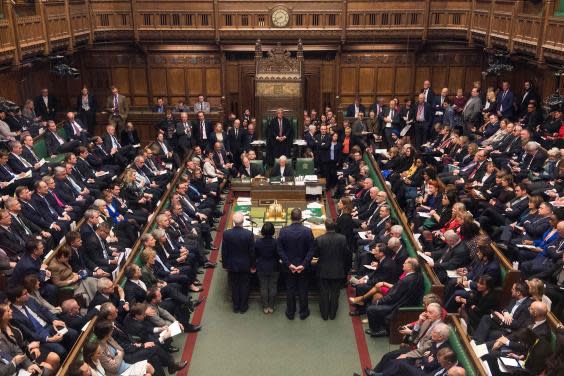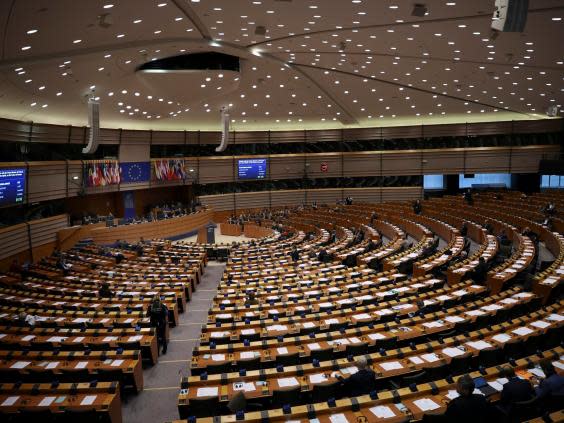From Brussels to Westminster: The House of Commons and European Parliament need to learn from each other
This is not the House of Commons, this is the European parliament.” These were the words deputy speaker Mairead McGuinness used on Wednesday to tell off former Ukip MEPs shouting down another member during a debate in Brussels.
The Brexit crisis has put the House of Commons in the international spotlight more than ever, and the chamber divides opinion. To some like McGuiness, the Commons’ boisterous atmosphere and over-the-top shouting is a sign that MPs do not take things things seriously. It is criticised as being an archaic, hostile environment that disadvantages anyone who doesn’t take a macho approach to politics – often women.
Others speak highly of the drama of Britain’s mother of parliaments and sigh wearily at the dour debates in other legislatures like the European parliament. Many foreign observers who watch the Commons for the first time are captivated. An amazed American friend once genuinely asked me whether he was watching footage “from a movie”. Prime minister’s questions features regularly on US political channel C-Span and makes far more appearances there than any other foreign legislature – because it is so watchable.
I covered Westminster for years and made the jump to Brussels in 2017. I arrived with high expectations of the European parliament, expecting a modern legislature that was rationally designed rather than evolved through the centuries. Not every expectation was met: after a year and a half of working in the EU capital I believe Brussels is better than Westminster in some respects – but worse in others.
Let’s start with the bad: what passes for “debate” in Brussels is a joke, and beyond awful. In Westminster the format for asking questions to a minister is designed to put them on the ropes – they get quizzed by their opposition counterpart and have to give an answer immediately after they are asked. Then there are follow-ups. Backbenchers can raise questions afterwards. If the minister doesn’t give good answers, they look stupid or evasive. It is not uncommon for answers to be newsworthy; sometimes unintentionally.
Not so in Brussels: first, MEPs ask their questions. Then, after all the questions have been asked, the commissioner does a single summing up speech in response where he picks the questions he likes and pretends uncomfortable ones didn’t exist. There is practically zero scrutiny applied, and the system incentivises MEPs to do a piece of grandstanding to camera, so their clip can be shared on Facebook later and get 17 likes.
Some MEPs are better at exploiting this dynamic than others. Pro-Europeans in the UK would do well to remember that it was the European parliament, not Westminster, that gave Nigel Farage his platform to rail against the EU. The former Ukip leader is a master at the grandstand-to-viral-video formula: one extended clip of him insulting former European Council president Herman Van Rompuy (“You have all the charisma of a damp rag and the appearance of a low-grade bank clerk.”) is perhaps the single most popular clip in the history of the Parliament. It has several million views across dozens of different uploads on YouTube and other streaming sites and made Farage an overnight celebrity across the world – catching the eyes of US news channels where he is now a regular fixture and an ally of Donald Trump.
[[gallery-0]]
Furious rhetoric has become a cottage industry: other typical video titles include “‘Who the Hell do you Think You Are?’ Nigel Farage throws egg in Eurocrat faces”, “Nigel Farage: I want you all fired!” and “‘You Are a TERRIBLE Leader’ – Nigel Farage Tells Angela Merkel Everything To Her Face”. In some ways the dynamic of the parliament’s broken debates has undermined the European project itself and allowed shouty populists to differentiate themselves in a field where reasoned debate is always overshadowed by grandstanding.
The minimal time allocated for debates in Brussels is also a serious problem that prevents serious discussion. Often, only the leaders of the European parliament’s political groups get time to speak – backbenchers are often omitted altogether, even on big issues. When regular MEPs do get a word in, it will only be a handful of them. Even the group leaders are regularly told by the chair to hurry up – we don’t have all day. A massive basketball-style clock with red lettering looms over MEPs telling them how much speaking time they have used.
This is unforgiveable, and it need not be this way. The limited speaking time is a function of the fact the parliament barely sits – the main chamber is usually in use for around four days a month, with occasional extra “extraordinary” sessions lasting two days. The Commons, by contrast, sits over twice as many days – even though MPs tend to have more intensive constituency duties than MEPs do. It would be easy to find more time for proper debates if only the parliament actually met more regularly.

Westminster has its fair share of ridiculous spectacles: mock hostage-taking during the state opening of parliament, £80,000 animal skin parchments, and the magic mace (don’t pick it up!). But none of these traditions are as bizarre and disruptive as the monthly caravan of MEPs and their staff marching from Brussels to Strasbourg. For the unfamiliar: the European Parliament’s main offices are in Belgium’s capital, but because of a historical quirk and a whole lot of politics, it conducts most of its main sessions in France. To give you an idea of how sensible this is, the transport infrastructure between the cities is so poor that the fastest way is actually to go on the train via Paris (the parliament, in fact charters special TGVs from the French national railway company for some staff). If you’ve ever looked at a map you’ll appreciate that this makes no sense: Paris is 400km from Strasbourg, and not in the right direction.
France has an effective veto on ending the practice, and even Emmanuel Macron, for all his alleged reforming zeal, wants to keep it. The situation is so inconvenient that the parliament’s secretariat actually offers to pay expenses for journalists to come to Strasbourg to encourage some to show up. It is, at least, a lovely city – certainly worth a visit or 12.
It should be clear that the European parliament is absolutely not the ideal legislature of some British pro-Europeans’ imaginations. And yet, there is a lot that Westminster could learn from it
Jon Stone
It should be clear that the European parliament is absolutely not the ideal legislature of some British pro-Europeans’ imaginations. And yet, there is a lot that Westminster could learn from it.
The overall EU legislative process is notoriously long and convoluted, but the legislative scrutiny the parliament provides is generally very good: independent committees of MEPs and rapporteurs scrutinise laws coming from the commission and council, and all MEPs get a binding vote on their recommended changes, which are often substantial and well thought-out. Elections by proportional representation mean the commission presidency never really has an absolute single-party majority and the law-making process is genuinely consensual – it is harder to railroad through legislation than in the UK.

Some of the nuts and bolts of how the European parliament works are also very impressive to someone used to the 16th century practises still operating in the Commons. MEPs vote electronically, which means it takes about 10 seconds to process a vote. In Westminster a single amendment will take 15 minutes because all 650 MPs have to physically go and stand in a room together to be counted: the present system of having two division lobbies dates back to 1835 but a similar system, which used only one lobby, dates back to at least 1584.
You might think that the fact MEPs speak dozens of different languages from 28 countries would be a problem, but this is actually dealt with very well. The translation set-up is practically one of the wonders of the modern world – everyone can talk and listen to everyone else in their native language. Sometimes MEPs choose to speak in English: some are better than others, and the language barrier makes genuinely inspiring rhetoric sparse, though some does occasionally shine through.
In many respects the European parliament is also far more open than Westminster. If you want to report on the House of Commons in person as a journalist, you need to be a member of the press gallery. This requires a parliamentary security pass, of which there are a limited number for journalists, with a set allocation for established publications. It is hard to get one, they are jealously guarded, and the whole system is very much a closed shop.
In Brussels anyone who can prove they are a bone fide journalist can get a pass that gives them access to the EU institutions: a letter from your editor and samples of work will do. This thankfully made it easy for The Independent to set up shop here, but it also means there are far more freelancers, upstart publications, and smaller specialist outfits catering to interested audiences. Given the technical nature of a lot of legislation the EU deals with, having specialists on hand is crucial: it’s good for scrutiny, and it’s good for democracy. There has been some movement in the UK to allow new publications into the press gallery, but the issue is contentious and the process of who is allowed in is not always transparent. Specialist reporters are usually confined to newsrooms for lack of parliamentary passes – while in Brussels agricultural subsidy specialists wander the halls freely with financial services reporters and health policy correspondents.
One big difference between the two places is that in the UK, parliament is the centre of political life – it is where the bulk of the political press corps tends to work and where major events happen. This is not the case in Brussels: because of the way the EU is set up, the parliament plays second – or even third – fiddle to the European Commission and European Council, which are a short walk away and where most journalists congregate. The most important daily press briefing in Brussels happens at the commission, in an auditorium, on camera – while in Westminster it is done in an obscure wood-panelled room, up too many staircases, on semi-anonymous terms.
The European parliament has gained more powers and importance in recent years, but it cannot yet claim to be a fully-fledged legislature – notably it lacks the ability to actually suggest laws; known as legislative initiative. But in practice in Westminster there is little legislative initiative from the backbenches anyway: the UK’s broken private members’ bill system, where practically every law is talked out or “filibustered” even if there is a majority for it, means that the government has a very firm grip on the statute book indeed.
Some differences between Westminster and Brussels are a matter of taste: Westminster, notably, sits in a gothic palace, while the parliament buildings in Brussels and Strasbourg are modern glass, steel, and concrete – both styles have their fans and detractors. In one way, though, the two places are more similar than they might like to admit: it notably is very easy to get lost in both, thanks to a shared history of repeated extensions, badly connected annexes, and endless nondescript corridors.
There is no really answer to which parliament is better: they can both learn from each other. And really, they both need to.

 Yahoo News
Yahoo News 